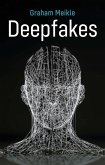Until fairly recently, only serial killers and lunatics had profiles. Yet today, almost everyone is profiled through social media, mobile phones, and a multitude of other methods. But where does the idea of "profiling" come from, how has it changed over time, and what are its implications?
In this book, Andreas Bernard examines contemporary profiling's roots in late-nineteenth-century criminology, psychology, and psychiatry. Data collection techniques previously used exclusively by police or to identify groups of people are now applied to all individuals in society. GPS transmitters and measuring devices are now unconsciously embraced to have fun, communicate, make money, or even find a partner. Drawing perceptive parallels between modern technologies and their antecedents, Bernard shows how we have unwittingly internalized what were once instruments of external control and repression.
This illuminating genealogy of contemporary digital culture will be of interestto students and scholars in media and communication, and to anyone concerned about the power technologies hold over our lives.
In this book, Andreas Bernard examines contemporary profiling's roots in late-nineteenth-century criminology, psychology, and psychiatry. Data collection techniques previously used exclusively by police or to identify groups of people are now applied to all individuals in society. GPS transmitters and measuring devices are now unconsciously embraced to have fun, communicate, make money, or even find a partner. Drawing perceptive parallels between modern technologies and their antecedents, Bernard shows how we have unwittingly internalized what were once instruments of external control and repression.
This illuminating genealogy of contemporary digital culture will be of interestto students and scholars in media and communication, and to anyone concerned about the power technologies hold over our lives.
"How did surveillance technologies evolve from a sinister past in the panopticon prison or the state police to a contemporary scenario where tracking apps run ubiquitously on the mobile phones of billions of people? In this engaging cultural history of measurement and quantification technologies, Andreas Bernard shows how the technology of profiling migrated from criminology into mainstream use, and how the Web changed from a mythology of mobility and boundlessness to one of location and fixity. Have we fulfilled the dreams of totalitarian governments? Or does today's infrastructure facilitate some other, new form of society?"
Alexander R. Galloway, author of The Interface Effect
Alexander R. Galloway, author of The Interface Effect








